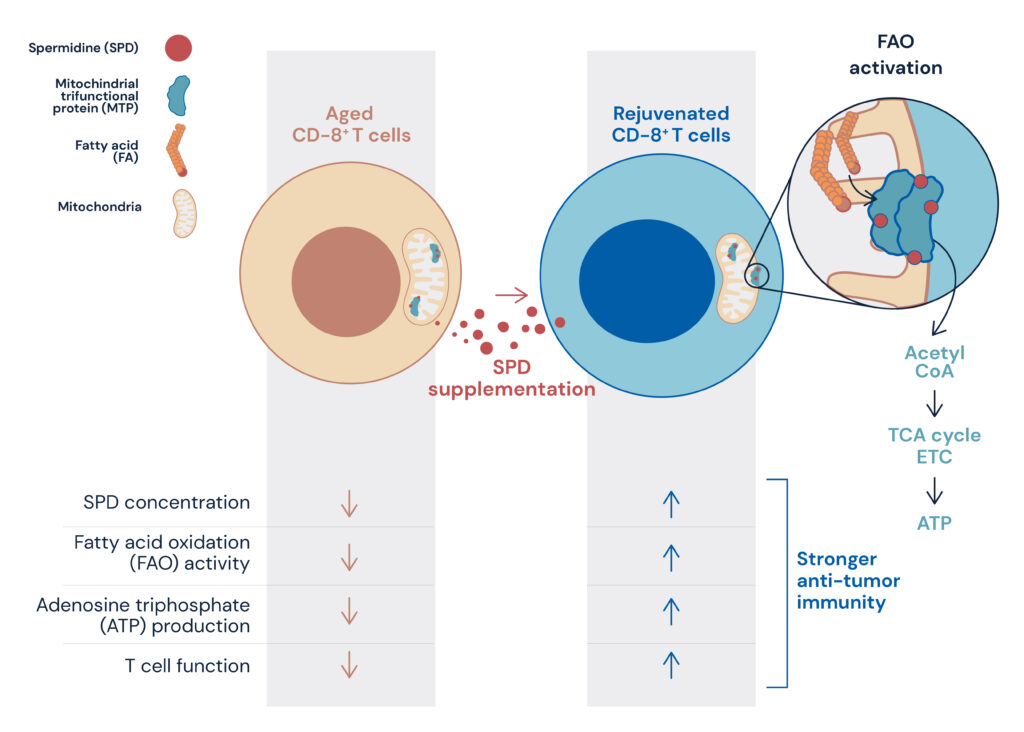Spermidine is known to extend the health and lifespan across various species. It also is an increasingly common over-the-counter supplement. Over the past few years, possible uses of spermidine in cancer treatment have been investigated, but results have been somewhat mixed. While increase intake of spermidine appears to suppress tumorigenesis, it also promotes the growth of established cancers.
In a new paper published in Science, Muna Al-Habsi, Kenji Chamoto, Ken Matsumoto, and Norimichi Nomura in the lab of Tasuku Honjo and their colleagues add a new twist to this story. Immune cells age, like other cells, leading to a decrease in the sheer firepower and ability of the immune system to deal with pathogens or cancer cells. As a result, the frequency of severe infections increases with age, as does the prevalence of cancer.
Also, it is well established that the effectivity of cancer immunotherapy targeting the PD-1 pathway decreases with age. Thus, cancer immunotherapy has been shown to be least effective in the patient population where it is most needed. Numerous research projects and clinical studies worldwide are attempting to address this problem, and to enhance the efficacy of cancer immunotherapy in aged patients
In this new paper, Al-Habsi and her colleagues not only demonstrate that Spermidine can indeed reverse aging effects in mammalian immune cells, they also do provide mechanistic insight on why this is the case.
Figure: Spermidine supplementation rejuvenates CD8+ T cells which, in turn, enhances the efficacy of cancer therapies targeting the PD-1 pathway

At first, Al-Habsi et al. looked at the presence of spermidine in young and aged CD8+ T cells and found that spermidine in aged T cells had increased to about half, when compared to young T cells—leading to impaired mitochondrial activity. When spermidine is supplemented, indicators for mitochondrial health cells increase. It was further demonstrated that, in mice, spermidine can enhance the anti-tumor activity of CD8+ T cells when administered in combination with anti–PD-L1 antibodies in vivo both in aged mice as well as in young mice unresponsive to anti–PD-L1 antibody treatment alone. Combination treatment of spermidine and anti–PD-L1 antibody results in the proliferation of CD8+ T cells, as well as in increased cytokine production and mitochondrial ATP production. Further in vitro studies suggested that spermidine binds directly to mitochondrial trifunctional protein (MTP), leading to enhanced enzymatic fatty acid oxidation (FAO).
By contrast, it was found that spermine also binds to MTP, but completely inhibits the FAO activity of spermidine. Further, it was demonstrated that MTP is necessary for the spermidine-dependent T-cell activity in PD1-blockade immunotherapy
Based on the above results, scientists at CCII are now planning to investigate the possible use of spermidine in dealing with age-related immune pathologies as well as to enhance the efficacy of treatments that block the PD-1 pathway in aged patients where the immune response is not adequate or in patients that do not respond well to therapies targeting PD-1.
Reference:
Muna Al-Habsi, Kenji Chamoto, Ken Matsumoto, Norimichi Nomura, Baihao Zhang, Yuki Sugiura, Kazuhiro Sonomura, Aprilia Maharani, Yuka Nakajima, Yibo Wu, Yayoi Nomura, Rosemary Menzies, Masaki Tajima, Koji Kitaoka, Yasuharu Haku, Sara Delghandi, Keiko Yurimoto, Fumihiko Matsuda, So Iwata, Toshihiko Ogura, Sidonia Fagarasan, Tasuku Honjo. Spermidine activates mitochondrial trifunctional protein and improves antitumor immunity in mice. Science, 378(6618):eabj3510 (2022). DOI: https://doi.org/10.1126/science.abj3510
